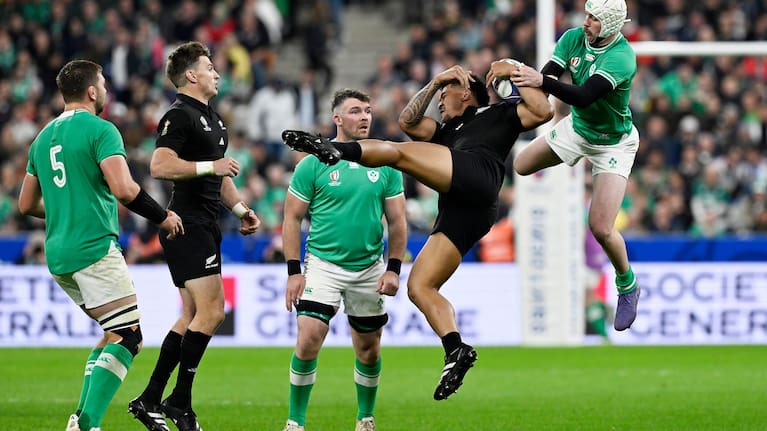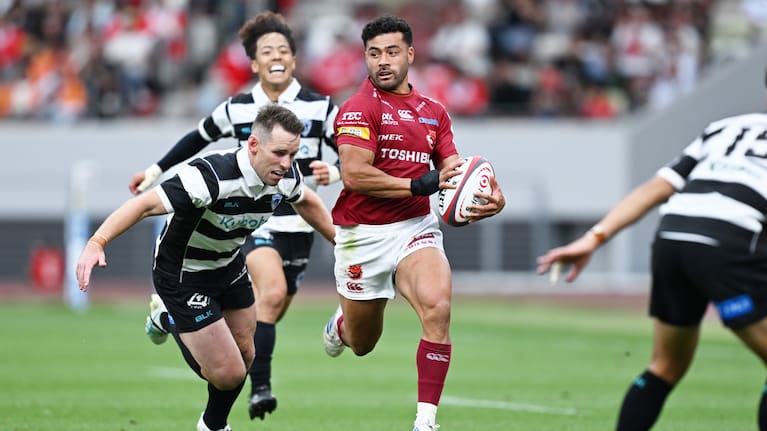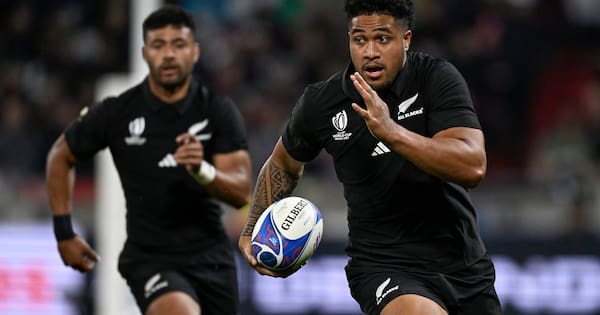Leicester Fainga’anuku’s ineligibility for All Blacks selection on his return to New Zealand highlights the barriers Richie Mo’unga faces if or when he arrives back from Japan next year.
Fainga’anuku, 25, represented the All Blacks at the 2023 World Cup in France, playing against the hosts in the pool match and scoring an early try in the gripping quarter-final victory over Ireland when starting in the No.11 jersey.
The blockbusting wing/ midfielder was at the top of his game when he left to play two seasons for Toulon, scoring 13 tries in 13 matches for the Crusaders as they swept to their seventh consecutive Super Rugby title.
Unfortunately for Fainga’anuku, who has played seven Tests, he does not qualify for an immediate return to the All Blacks because he did not meet the threshold of 70 Tests or period of long service in Super Rugby before his departure.
All Blacks head coach Scott Robertson does have the option of selecting Fainga’anuku for the Rugby Championship, which starts with a Test against Argentina in Cordoba a week on Sunday, should he suddenly face an injury crisis, but that appears unlikely.
Robertson’s midfield stocks are overflowing after the retention of Timoci Tavatavanawai following the Highlander’s Test debut last month. While Caleb Clarke is carrying an injury, Rieko Ioane appears set to remain on the left wing.

Emoni Narawa, Will Jordan and Ruben Love are the other outside back options, with the uncapped Leroy Carter called in as cover.
This means. despite his game-breaking ability and undeniable potential value for the All Blacks in their looming Tests against South Africa at Eden Park and Wellington next month, Fainga’anuku appears set to play only NPC rugby until a probable recall for the end-of-year “grand slam” tour.
Asked about Fainga’anuku — who has signed a two-year contract with the Crusaders and New Zealand Rugby and will represent Tasman in this year’s NPC — during Monday’s squad announcement, Robertson replied: “There are measures in place if we need to bring him in if there was an injury… our conversation to him is keep playing well.”
A slight complication is that Fainga’anuku has returned with a shoulder issue and did not play for the Mako in their first-round defeat to Bay of Plenty at the weekend, although the injury is not thought to be serious.
Pressed on NZR’s eligibility protocols, Robertson would not go into detail but did say: “There are seven guidelines.
“It’s case-by-case and there are different measures to bring players in who have been overseas and who have signed for a shorter period of time.”
Mo’unga, who battled for supremacy against Beauden Barrett and Damian McKenzie but became the All Blacks’ first-choice No.10 before his departure to Japan club Toshiba after the 2023 World Cup, is in the same position as Fainga’anuku. But Mo’unga’s case will far more awkward for Robertson and NZ Rugby to explain if he returns next year as hoped.

Mo’unga, 31 — who continued his run of leading a team to a domestic championship recently and was recognised as the Japan One competition’s MVP — has played 57 Tests and so is also short of the 70-Test threshold.
With Barrett, McKenzie and Love all options for the black No.10 jersey, Robertson is unlikely to be able to lean on an injury exemption to bring him straight back.
Chiefs’ 10 McKenzie was ineligible for the All Blacks after returning from a stint in Japan in 2022 due to the eligibility laws and may feel hard done by to see them waived for Mo’unga.
Putting aside the argument that Mo’unga could have reached the threshold had previous coaches Sir Steve Hansen and Ian Foster put their faith in the playmaker earlier, it would be self-destructive if NZ Rugby stand firm on their policy on his return – which could be as early as May next year.
If the organisation, and more particularly its board, did not grant an exemption, Mo’unga would miss the Nations’ Cup and highly-anticipated three-Test “Greatest Rivalry” tour of South Africa.
That would make about as much sense as NZ Rugby pleading with Toshiba to release Mo’unga from the final year of his contract to allow him to return early and represent the All Blacks this year, when in reality it was NZ Rugby’s own policy preventing him from doing so.
It is also notable that NZ Rugby is tying itself in knots over its eligibility laws while Rugby Australia have effectively scrapped theirs and the Wallabies are about to become far stronger as a result.

